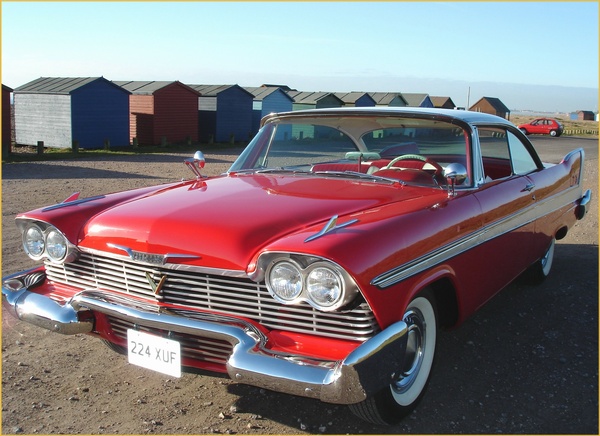Truls Thorstensen (EFS Consulting Vienna), Karl Grammer (Ludwig Boltzmann Institute for Urban Ethology) and other researchers at the University of Vienna say that people make lots of assumptions about sex, age, emotions, and intentions by looking at human faces - and we do it with cars as well.
They're not the first ones to come up with this idea; five year olds have been finding personalities in inanimate objects for thousands of years and my kid has been saying "Ka-chow!" ever since he saw Cars, but they are the first ones to tackle it in a systematic fashion.
How did they do it? They asked people to describe car grills anthropomorphically. Then they used geometric morphometrics to calculate the corresponding shape information, whatever that means. One-third of the respondents associated a human or animal face with over 90 percent of the cars and everyone noted eyes (headlights), a mouth (air intake/grill), and a nose in 50 percent of the cars. Yep, that means people think cars have a personality.

The authors found that people liked cars most which had a wide stance, a narrow windshield, and/or widely spaced, narrow headlights. Kind of like a golden ratio for cars, except mostly made up. They found that cars with high values of what they called "power" were the most liked. Both men and women like mature, dominant, masculine, arrogant, angry-looking cars.
Not in California. In California driving a Prius is the equivalent of showing up in a tuxedo holding a puppy and offering to do the laundry while a real car that won't get you cussed at in the HOV Lane will result in pig blood being thrown on you. I looked in the parking lot just now and, except for my car, this 'masculine' business is nowhere to be found. I know they sell a lot of SUVs here so I have to assume they are a dirty secret unless it's time to drive into the Sierra's for the weekend, and even then there has to be a "Keep Tahoe Blue" sticker on the back.
Lost in the study; the notion that car manufacturers may simply be making cars people like, but that is chicken and egg stuff to evolutionary psychologists.
So does this mean environmental activist women secretly swoon at the sight of a Dodge Viper? Not likely. It is more likely that they just make determinations about the owner based on the car, much like they would a human 'grill' - in the case of driving a Viper that means you hate the planet, are an oil baron and kill kittens for amusement, just as this picture of Lee Raymond of Exxon told people a lot about him.

Hardly news, as any man with a decent car who has been asked smarmily if he is 'overcompensating' for other defects can attest. Thanks Freud.
In other words, the car you drive is just another way that people will stereotype you. That's good news for car manufacturers and advertisers, though they already knew it. All those Bob Seger songs in commercials aren't designed to make people think big trucks are for the opera, they are designed to make men who need to haul some boxes to the recycling center once every few months feel like they are lumberjacks while doing it.
Authors: "We show that distinct features in the car fronts correspond to different trait attributions. Thus, humans possibly interpret even inanimate structures in biological terms, which could have implications for driving and pedestrian behavior. With respect to practical applications, a tool for automobile designers to style cars according to a desired image could be derived."
In other words, make cars people like. But don't get carried away with making cars that look like people. As The Polar Express showed, the closer fake faces get to real faces, the creepier they are.
Reference: Windhager S, Slice DE, Schaefer K, Oberzaucher E, Thorstensen T, Grammer K (2008). Face to face: The Perception of Automotive Designs. Human Nature. DOI 10.1007/s12110-008-9047-z




Comments